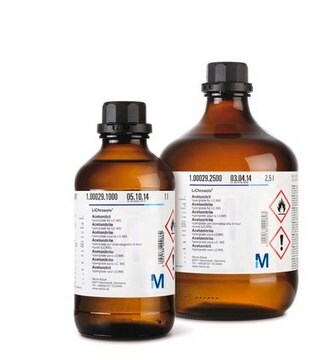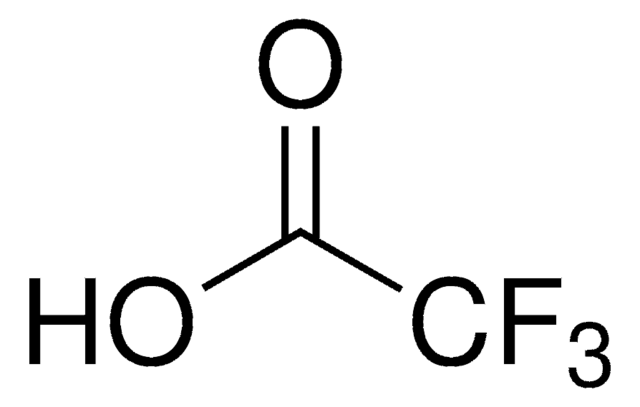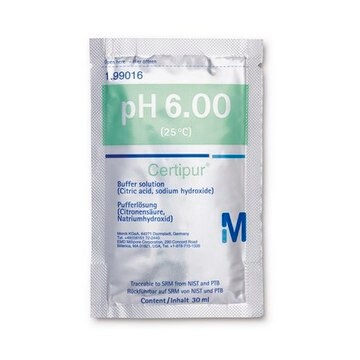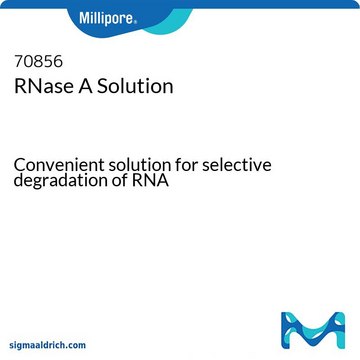345832
Galectin-3C, Human, Recombinant, E. coli
Iniciar sesiónpara Ver la Fijación de precios por contrato y de la organización
About This Item
Código UNSPSC:
12352202
NACRES:
NA.77
Productos recomendados
Análisis
≥95% (SDS-PAGE)
Nivel de calidad
formulario
lyophilized
fabricante / nombre comercial
Calbiochem®
condiciones de almacenamiento
OK to freeze
avoid repeated freeze/thaw cycles
impurezas
≤1 EU/μg protein Endotoxin
solubilidad
sterile PBS: 1 mg/mL
Condiciones de envío
wet ice
temp. de almacenamiento
−20°C
Descripción general
Recombinant, human galectin-3 expressed in E. coli and subsequently cleaved with Clostridium histiolyticum collagenase type VII to yield galectin-3C. The resulting galectin-3C is purified by affinity chromatography. Galectin-3C is a truncated form of galectin-3 that contains the carbohydrate binding domain but lacks the 107 amino acids at the N-terminus of galectin-3. It is suggested to play a key role in autoimmune diseases, allergic reactions, inflammation, tumor cell metastasis, atherosclerosis, and diabetes.
Recombinant, human galectin-3 expressed in E. coli and subsequently cleaved with Clostridium histolyticum collagenase type VII to yield galectin-3C. The resulting galectin-3C is purified by affinity chromatography. Galectin-3C is a truncated form of galectin-3 that contains the carbohydrate binding domain but lacks the 107 amino acids at the N-terminus of galectin-3. It is suggested to play a key role in autoimmune diseases, allergic reactions, inflammation, tumor cell metastasis, atherosclerosis, and diabetes.
Advertencia
Toxicity: Standard Handling (A)
Forma física
Lyophilized from deionized water, 2µg lactose/µg lectin.
Reconstitución
Following reconstitution, aliquot and freeze (-20°C). Stock solutions (in the presence of a molar excess of lactose) are stable for up to 4 months at -20°C. For use in carbohydrate binding assays the solution should be dialyzed to remove the lactose stabilizer.
Otras notas
Hoyer K.K., et al. 2004. Am. J. Pathol.164, 893.
John C.M., et al. 2003. Clin. Cancer Res.9, 2374.
Iurisci, I., et al. 2000. Clin Cancer Res6, 1389.
Van Den Brule, F. A., et al. 2000. Int. J. Cancer89, 361.
Inohara, H. 1999. Cancer85, 2475.
Nakamura, M., et al. 1999. Int. J. Oncol.15, 143.
Idikio, H., et al. 1998. Int. J. Oncol.12, 1287.
Ochieng, J., et al. 1998. Biochim. Biophys. Acta.1379 97.
Castronovo, V., et al. 1996. J. Pathol.179, 43.
Liu, F.T., et al. 1996. Biochemistry35 6073.
Schoeppner, H. L., et al. 1995. Cancer75, 2818.
Massa, S.M., et al. 1993. Biochemistry32, 260.
Oda, Y., et al. 1991. Gene99, 279.
John C.M., et al. 2003. Clin. Cancer Res.9, 2374.
Iurisci, I., et al. 2000. Clin Cancer Res6, 1389.
Van Den Brule, F. A., et al. 2000. Int. J. Cancer89, 361.
Inohara, H. 1999. Cancer85, 2475.
Nakamura, M., et al. 1999. Int. J. Oncol.15, 143.
Idikio, H., et al. 1998. Int. J. Oncol.12, 1287.
Ochieng, J., et al. 1998. Biochim. Biophys. Acta.1379 97.
Castronovo, V., et al. 1996. J. Pathol.179, 43.
Liu, F.T., et al. 1996. Biochemistry35 6073.
Schoeppner, H. L., et al. 1995. Cancer75, 2818.
Massa, S.M., et al. 1993. Biochemistry32, 260.
Oda, Y., et al. 1991. Gene99, 279.
Información legal
CALBIOCHEM is a registered trademark of Merck KGaA, Darmstadt, Germany
Código de clase de almacenamiento
11 - Combustible Solids
Clase de riesgo para el agua (WGK)
WGK 2
Punto de inflamabilidad (°F)
Not applicable
Punto de inflamabilidad (°C)
Not applicable
Certificados de análisis (COA)
Busque Certificados de análisis (COA) introduciendo el número de lote del producto. Los números de lote se encuentran en la etiqueta del producto después de las palabras «Lot» o «Batch»
¿Ya tiene este producto?
Encuentre la documentación para los productos que ha comprado recientemente en la Biblioteca de documentos.
Nuestro equipo de científicos tiene experiencia en todas las áreas de investigación: Ciencias de la vida, Ciencia de los materiales, Síntesis química, Cromatografía, Analítica y muchas otras.
Póngase en contacto con el Servicio técnico






